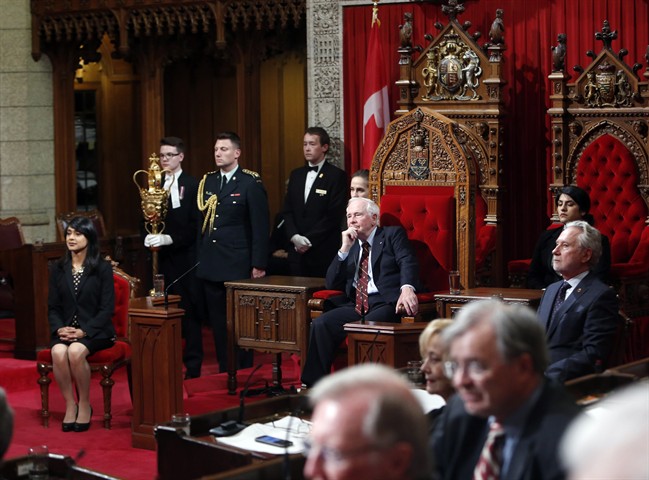The inner workings of the Senate probably aren’t something the average Canadian thinks about on a regular basis.

Normally, Parliament’s upper chamber only makes headlines when one of its residents does something embarrassing, or scandalous, or when a new crop of senators is unveiled.
But the Senate has been undergoing substantial changes over the last year that have recently come to a head, and it’s having consequences that may trickle down to nearly every Canadian.
Here’s a look at how we ended up here, and what it means.
An independent Senate
The Senate is — simply put — the bridge new legislation must cross after it gets the green light from the House of Commons, but before it can become law.
It was, until recently, a pretty partisan place. Successive Conservative and Liberal governments have been able to count on their party’s Senate caucus to move bills along without much fuss, or many amendments.
READ MORE: ‘I wanted a Senate that actually takes its job seriously’ Trudeau maintains
But in 2014, Justin Trudeau shook things up. As leader of the third party, he expelled 32 senators from the Liberal caucus, leaving them to sit as independents.
Then, once he was prime minster, Trudeau created a special selection committee and named more than 20 additional people to the upper chamber — again as independents. The Conservative senators in the chamber, meanwhile, remain linked to the Tory caucus in the House of Commons.
Why should I care?
What this means is that a majority of senators are now technically voting according to their conscience, not according to what any particular party (or prime minister) may want.
READ MORE: How independent will Canada’s new senators be?
Independent votes are great idea, in theory, for a chamber that’s supposed to be all about sober second thought. But in practice, it’s been a challenge.
“We’re entering into a new era of parliamentary process here,” said Errol Mendes, a professor of constitutional and international law at the University of Ottawa.
Mendes said Trudeau “has to accept that now, that sort of discipline doesn’t exist anymore … I think he has to live up to his reforms.”
Most independent senators recently appointed by the prime minister have dutifully backed the Liberal government’s bills, but the “Senate Liberals” he kicked out of caucus two years ago are actually proving to be less supportive. The PM has said that’s exactly what he was aiming for.
WATCH: Unpacking the Politics of the Senate’s power

Senators have tweaked about half a dozen pieces of legislation since late 2015, and recently they even sent the budget bill back with changes linked to increased booze taxes. That was after they nearly ripped out an entire section of the bill that would have created a federal infrastructure bank.
Still, Mendes maintains, the budget “kerfuffle” has been overblown. All told, he said, senators have only made changes to about a quarter of the bills they’ve been asked to review (admittedly a jump from the measly four per cent in the past). When the Commons has pushed back, the Senate has backed down every time.
“Given the stats, it hasn’t really affected Canadians that much,” Mendes said. “When you sort of delve deeper, on certain areas there’s actually a real benefit to Canadians.”
Benefits and drawbacks
Mendes recalled that it was the Senate that flagged legal issues with the government’s bill on assisted dying, which ultimately passed without the suggested amendments.
While the back-and-forth between the two houses caused delays in passing the law, Canadians were watching that unfold, Mendes said, and some have already gone to court to challenge the restrictions in the law “based on that they felt they had support from the Senate.”
The recent citizenship bill was similarly amended by senators to add a right of appeal for people who lose their citizenship because it was “obtained fraudulently” — sometimes without their knowledge.
“The Senate did a great service, because now you have to go to court,” Mendes said.
Moving forward, proposed laws may continue looking different from what the government promised, in ways big and small. That could even be the case for bills like the legislation to legalize marijuana, which is supposed to become law by July 2018 — barring delay.
But delays are becoming common. After 20 months of governing, the Liberals have enacted just half the number of bills that were enacted by the previous Harper government by the halfway point of its mandate. Part of the problem is the more independent Senate.
WATCH: Why isn’t Justin Trudeau filling key government positions?

Several bills have, additionally, gotten lodged in the Senate over the last year and refused to budge. The bill amending the words to ‘O Canada’ is one example, as is Bill C-16, which prohibits discrimination against transgender Canadians. It finally passed this month.
“It became quite certain that there was … basically personal antagonism towards the bill which just confounded everyone who works in the area and understands how important it is for (the transgender) community,” Mendes said.
Reporters outside the House of Commons on Wednesday hounded every minister they could find for their thoughts on the upper chamber’s shift. Social Development Minister Jean-Yves Duclos came closest to acknowledging the challenges.
“It’s a bit more complicated than it was before, perhaps, in terms of the environment of respect and collaboration,” he said. “But I think it will also work best for Canadians.”
Mendes agrees.
“Once we get predominantly independent senate, I think it’s going to turn out to be one of the best think-tanks that this country has ever had.”
- What is a halal mortgage? How interest-free home financing works in Canada
- Capital gains changes are ‘really fair,’ Freeland says, as doctors cry foul
- Ontario doctors offer solutions to help address shortage of family physicians
- Budget 2024 failed to spark ‘political reboot’ for Liberals, polling suggests




Comments